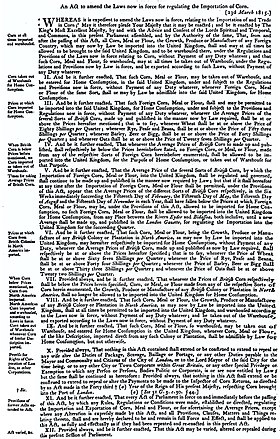
Back Житни закони Bulgarian Obilné zákony Czech Corn Laws German Grenleĝo Esperanto Leyes de cereales Spanish قوانین ذرت Persian Viljalait Finnish Corn Laws French חוקי הדגן HE Հացի օրենքներ Armenian

The Corn Laws were tariffs and other trade restrictions on imported food and corn enforced in the United Kingdom between 1815 and 1846. The word corn in British English denoted all cereal grains, including wheat, oats and barley.[1] The laws were designed to keep corn prices high to favour domestic farmers, and represented British mercantilism.[a] The Corn Laws blocked the import of cheap corn, initially by simply forbidding importation below a set price, and later by imposing steep import duties, making it too expensive to import it from abroad, even when food supplies were short. The House of Commons passed the corn law bill on 10 March 1815, the House of Lords on 20 March and the bill received royal assent on 23 March 1815.
The Corn Laws enhanced the profits and political power associated with land ownership. The laws raised food prices and the costs of living for the British public, and hampered the growth of other British economic sectors, such as manufacturing, by reducing the disposable income of the British public.[3]
The laws became the focus of opposition from urban groups who had far less political power than rural areas. The first two years of the Great Famine in Ireland of 1845–1852 forced a resolution because of the urgent need for new food supplies. The Prime Minister, Sir Robert Peel, a Conservative, achieved repeal in 1846 with the support of the Whigs in Parliament, overcoming the opposition of most of his own party.
Economic historians see the repeal of the Corn Laws as a decisive shift towards free trade in Britain.[4][5] According to one 2021 study, the repeal of the Corn Laws benefitted the bottom 90% of income earners in the United Kingdom economically, while causing income losses for the top 10% of income earners.[6]
- ^ "CORN | English meaning – Cambridge Dictionary".
- ^ Cody, D (1987). "Corn Laws". The Victorian Web: literature, history and culture in the age of Victoria. Retrieved 16 September 2007.
- ^ Williamson, Jeffrey G (1 April 1990). "The impact of the Corn Laws just prior to repeal". Explorations in Economic History. 27 (2): 123–156. doi:10.1016/0014-4983(90)90007-L.
- ^ Findlay, Ronald; O'Rourke, Kevin H. (1 January 2003). "Commodity Market Integration, 1500–2000". NBER: 13–64.
- ^ Harley, C. Knick (2004). "Trade: Discovery, mercantilism and technology". The Cambridge Economic History of Modern Britain. pp. 175–203. doi:10.1017/CHOL9780521820363.008. ISBN 9781139053853. Retrieved 27 June 2017.
- ^ Irwin, Douglas A; Chepeliev, Maksym G (2021). "The Economic Consequences of Sir Robert Peel: A Quantitative Assessment of the Repeal of the Corn Laws". The Economic Journal. 131 (640): 3322–3337. doi:10.1093/ej/ueab029. ISSN 0013-0133.
Cite error: There are <ref group=lower-alpha> tags or {{efn}} templates on this page, but the references will not show without a {{reflist|group=lower-alpha}} template or {{notelist}} template (see the help page).